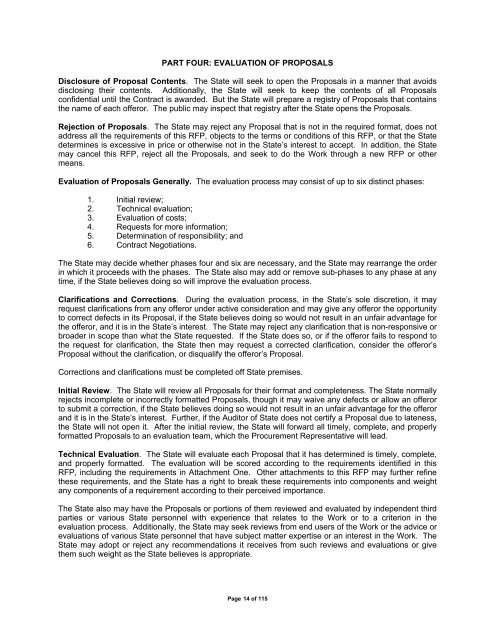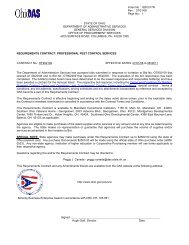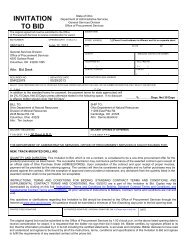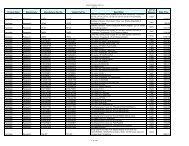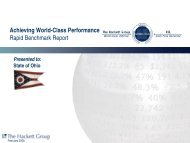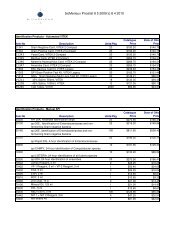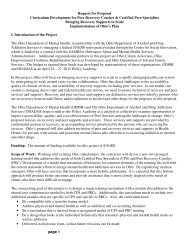REQUEST FOR PROPOSALS RFP NUMBER: 0A1031 DATE ISSUED
REQUEST FOR PROPOSALS RFP NUMBER: 0A1031 DATE ISSUED
REQUEST FOR PROPOSALS RFP NUMBER: 0A1031 DATE ISSUED
You also want an ePaper? Increase the reach of your titles
YUMPU automatically turns print PDFs into web optimized ePapers that Google loves.
PART FOUR: EVALUATION OF <strong>PROPOSALS</strong><br />
Disclosure of Proposal Contents. The State will seek to open the Proposals in a manner that avoids<br />
disclosing their contents. Additionally, the State will seek to keep the contents of all Proposals<br />
confidential until the Contract is awarded. But the State will prepare a registry of Proposals that contains<br />
the name of each offeror. The public may inspect that registry after the State opens the Proposals.<br />
Rejection of Proposals. The State may reject any Proposal that is not in the required format, does not<br />
address all the requirements of this <strong>RFP</strong>, objects to the terms or conditions of this <strong>RFP</strong>, or that the State<br />
determines is excessive in price or otherwise not in the State’s interest to accept. In addition, the State<br />
may cancel this <strong>RFP</strong>, reject all the Proposals, and seek to do the Work through a new <strong>RFP</strong> or other<br />
means.<br />
Evaluation of Proposals Generally. The evaluation process may consist of up to six distinct phases:<br />
1. Initial review;<br />
2. Technical evaluation;<br />
3. Evaluation of costs;<br />
4. Requests for more information;<br />
5. Determination of responsibility; and<br />
6. Contract Negotiations.<br />
The State may decide whether phases four and six are necessary, and the State may rearrange the order<br />
in which it proceeds with the phases. The State also may add or remove sub-phases to any phase at any<br />
time, if the State believes doing so will improve the evaluation process.<br />
Clarifications and Corrections. During the evaluation process, in the State’s sole discretion, it may<br />
request clarifications from any offeror under active consideration and may give any offeror the opportunity<br />
to correct defects in its Proposal, if the State believes doing so would not result in an unfair advantage for<br />
the offeror, and it is in the State’s interest. The State may reject any clarification that is non-responsive or<br />
broader in scope than what the State requested. If the State does so, or if the offeror fails to respond to<br />
the request for clarification, the State then may request a corrected clarification, consider the offeror’s<br />
Proposal without the clarification, or disqualify the offeror’s Proposal.<br />
Corrections and clarifications must be completed off State premises.<br />
Initial Review. The State will review all Proposals for their format and completeness. The State normally<br />
rejects incomplete or incorrectly formatted Proposals, though it may waive any defects or allow an offeror<br />
to submit a correction, if the State believes doing so would not result in an unfair advantage for the offeror<br />
and it is in the State’s interest. Further, if the Auditor of State does not certify a Proposal due to lateness,<br />
the State will not open it. After the initial review, the State will forward all timely, complete, and properly<br />
formatted Proposals to an evaluation team, which the Procurement Representative will lead.<br />
Technical Evaluation. The State will evaluate each Proposal that it has determined is timely, complete,<br />
and properly formatted. The evaluation will be scored according to the requirements identified in this<br />
<strong>RFP</strong>, including the requirements in Attachment One. Other attachments to this <strong>RFP</strong> may further refine<br />
these requirements, and the State has a right to break these requirements into components and weight<br />
any components of a requirement according to their perceived importance.<br />
The State also may have the Proposals or portions of them reviewed and evaluated by independent third<br />
parties or various State personnel with experience that relates to the Work or to a criterion in the<br />
evaluation process. Additionally, the State may seek reviews from end users of the Work or the advice or<br />
evaluations of various State personnel that have subject matter expertise or an interest in the Work. The<br />
State may adopt or reject any recommendations it receives from such reviews and evaluations or give<br />
them such weight as the State believes is appropriate.<br />
Page 14 of 115


